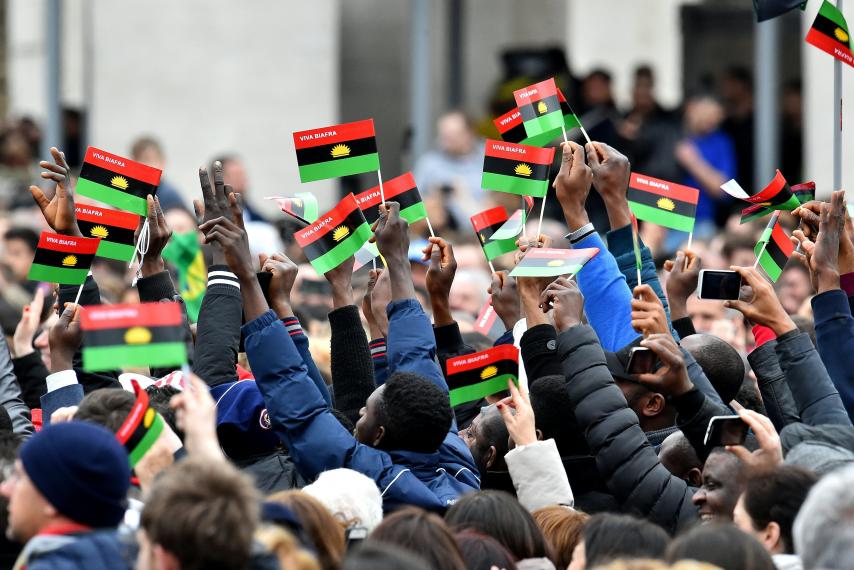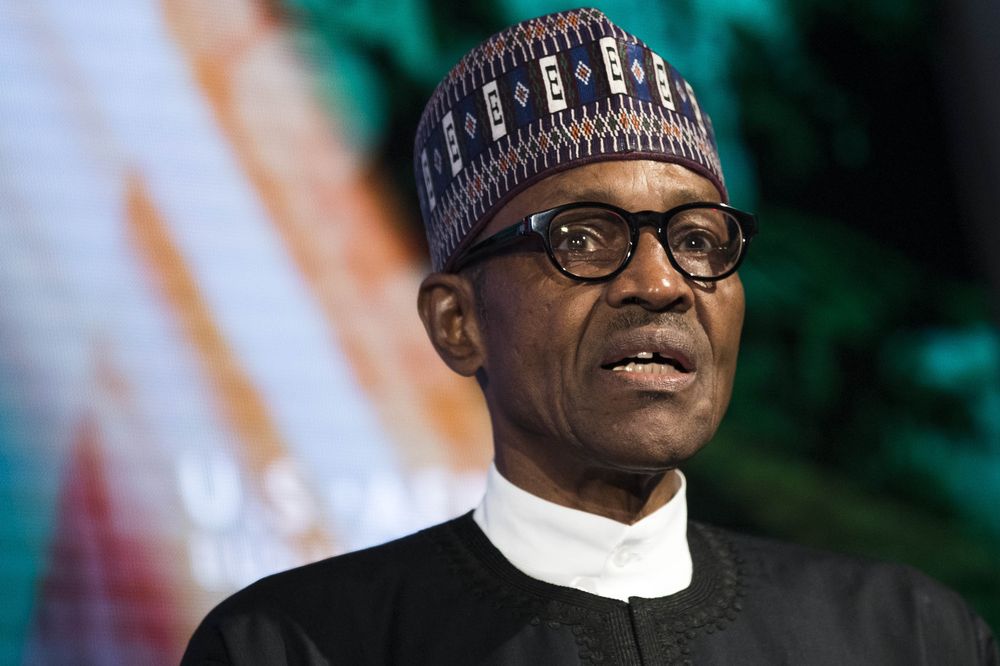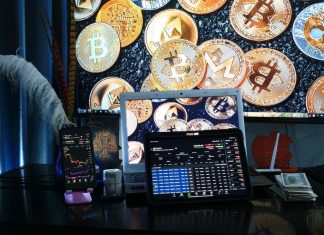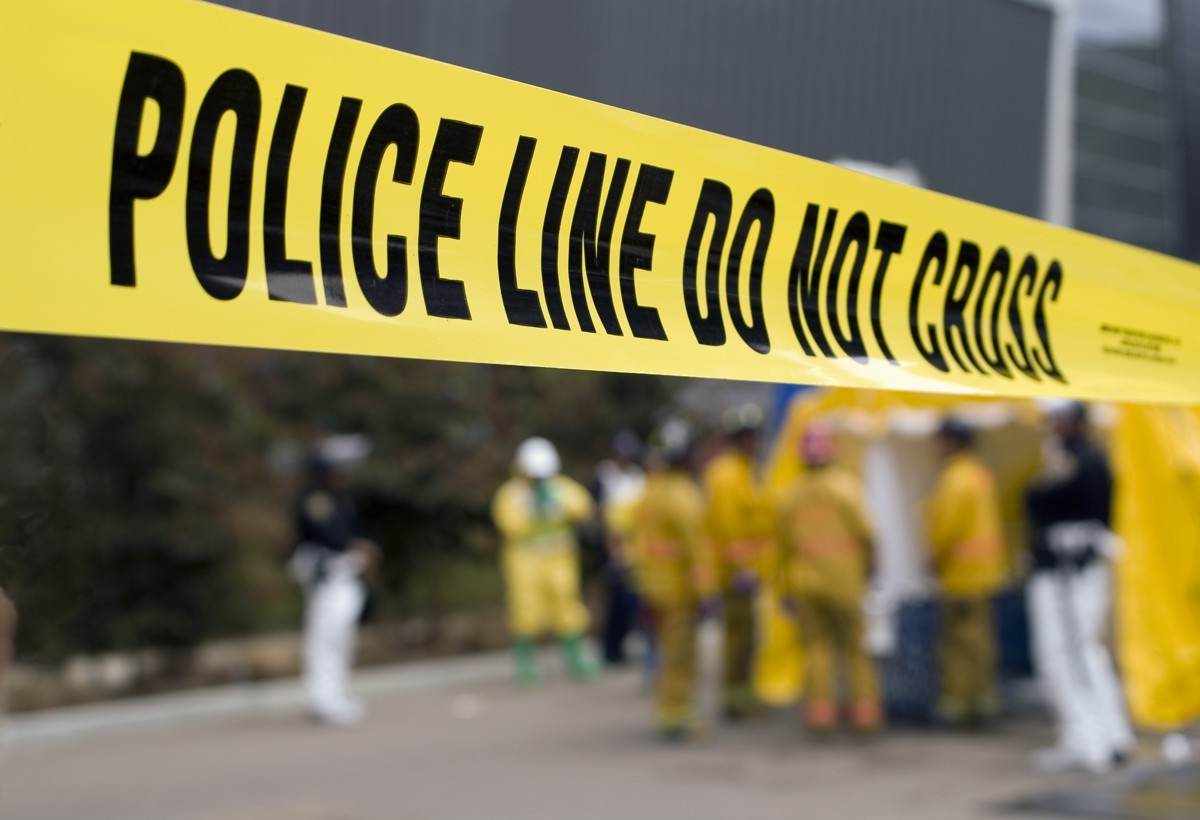[dropcap]T[/dropcap]hese are interesting times. We’re entering an interesting, new journalism era when newspaper editors will cast simple headlines but the public will nevertheless be confused. “Troops kill 14 terrorists in Plateau,” a headline could read. And readers would wonder: What kind of terrorists? Were they Biafra terrorists or Boko Haram terrorists? It could soon happen that we find our ourselves using the word ‘terrorism’ with the same ordinariness with which we do ‘armed robbery’. For that, we have ‘almighty’ President Muhammadu Buhari to thank.
Buhari’s crush-or-kill disposition to agitation was what the Defence Headquarters banked on when it hastily designated the Indigenous People of Biafra (IPOB) a terrorist group, before proceeding on a confusing and embarrassing volte-face, forcing Tukur Buratai, the Chief of Army Staff, to claim that the Army’s “pronouncement” was misinterpreted.
“You have to get it very clear,” Buratai said in that bizarre about-face. “First of all, what the Defence Headquarters did was to make a pronouncement. It wasn’t a declaration per se. But this has given room for the right step to be taken.”
It also gave out the administration as one whose well-documented disregard for the law is not accidental. The initial uproar about the DHQ’s declaration was that it was illegal but the illegality has now been corrected with the proscription of IPOB by an Abuja Federal High Court. Therefore, the contentiousness of that declaration is no longer about legality but now about propriety. Are IPOB members indeed terrorists?

The 14 acts of terrorism
Section 2 of the Terrorism (Prevention) Act 2011 as amended is very clear in its definitions of what constitutes terrorism: “act of terrorism” means an act which is deliberately done with malice, aforethought and which:
(a) may seriously harm or damage a country or an international organization;
(b) is intended or can reasonably be regarded as having been intended to—
(i) unduly compel a government or international organization to perform or abstain from performing any act;
(ii) seriously intimidate a population;
(iii) seriously destabilize or destroy the fundamental political, constitutional, economic or social structures of a country or an international organization; or
(iv) otherwise influence such government or international organization by intimidation or coercion; and
(c) involves or causes, as the case may be—
(i) an attack upon a person’s life which may cause serious bodily harm or death;
(ii) kidnapping of a person;
(iii) destruction to a Government or public facility, a transport system, an infrastructure facility, including an information system, a fixed platform located on the continental shelf, a public place or private property, likely to endanger human life or result in major economic loss;
(iv)the seizure of an aircraft, ship or other means of public or goods transport and diversion or the use of such means of transportation for any of the purposes in paragraph (b)(iv) of this subsection; *
(v) the manufacture, possession, acquisition, transport, supply or use of weapons, explosives or of nuclear, biological or chemical weapons, as well as research into, and development of biological and chemical weapons without lawful authority;
(vi) the release of dangerous substance or causing of fire, explosions or floods, the effect of which is to endanger human life;
(vii) interference with or disruption of the supply of water, power or any other fundamental natural resource, the effect of which is to endanger human life;
(d) an act or omission in or outside Nigeria which constitutes an office within the scope of a counter-terrorism protocols and conventions duly ratified by Nigeria.
(3) An act which disrupts a service but is committed in pursuance of a protest. However, demonstration or stoppage of work is not a terrorist act within the meaning of this definition provided that the act Is not intended to result in any harm referred to in subsection (2) (b)(i), (ii) or (iv) of this section.
Of these 14 infractions that constitute terrorism, IPOB, as a group, violated only three: C(iii), C(iv) and 3. Importantly, all violations did not come until the army released pythons to the south-east. Of these 14, Nnamdi Kanu breached at least 10. Had the court, on FG’s prompting, declared Kanu a terrorist, it would have been hard to fault the move, judging by the scale of hate preached by the IPOB leader, his call for the boycott of next month’s Anambra governorship election, and the way he continuously incited his followers to shed blood for the actualisation of Biafra. But any declaration of IPOB itself as a group of terrorists is an overkill, especially when this government has turned a blind eye to more dangerous groups.
The real terrorists
How on earth can IPOB members be terrorists when notorious killers, the herdsmen, have no such designation? We are talking about a group that was named in 2015 by the Global Terrorism Index as the fourth deadliest terror group in the world. Only Boko Haram, ISIS, and al-Shabab were deemed deadlier than this nomadic group of militants. In 2013, they killed around 80 people in total, but by 2014 the group had killed 1,229 and 847 in 2015.
“The little-known group, formed of individuals from the semi-nomadic, pastoral ethnic group Fula people existing across several West African nations… operates in Nigeria and parts of the Central African Republic,” The Independent wrote at the time. “As much as 92 percent of their attacks target private citizens, reflecting the group’s primary concern over the ownership of farmland. Each attack claims an average of 11 lives, with the largest known in April 2014 killing as many as 200 people after a group of the militants targeted community leaders and residents during a meeting in central province Zamfara.”
This group is, in fact, guiltier of terrorism than Nnamdi Kanu. But, sadly, all Buhari thinks of them is that they are a “criminal gang”, as evinced by Garba Shehu, one of his spokesmen, who said last week: “There is a difference between a criminal activity and a terrorist activity. Yes, some Fulani herdsmen are a criminal gang and they are being dealt with according to the law. But IPOB, like Boko Haram, has a territory they have carved out for themselves.”
If IPOB members are terrorists, what do we say of militants in the delta, particularly the Niger Delta Avengers, who actually did terrorise Nigeria by freely bombing oil installations, consequently plummeting oil production capacity, which in turn lowered the country’s crude oil earnings? The Avengers made Buhari’s opening months in office hell, costing Nigeria $7 billion (N2.1 trillion) between January and October 2016, according to the Nigerian National Petroleum Corporation (NNPC). Although they ticked at least 10 of the 14 offence boxes listed under the Terrorism Act, the Avengers were not designated as terrorists. After realising the futility of military crackdown on the bombers, he resorted to peace talks between representatives of the government and the militants, followed by the payment of outstanding monthly stipends to militants. Since then, the Avengers have left vengeance to God!
From the Avengers, Buhari must have learnt that force will always be trumped by dialogue; the surprise is why he won’t handle IPOB in a similar manner. By overseeing the proscription of IPOB and its declaration as a terrorist group, Buhari has managed to trivialise terrorism — a truly serious offence — to the realms of thuggery and armed robbery. Tomorrow, should the rest of us hit the streets in protest of an unfavourable policy, we could easily be marked down as terrorists. In case anyone is in doubt, the amended Terrorism Act prescribes up to death as punishment for terrorists. The makers of that law must be holding their heads in their hands, knowing this wasn’t the original plan.
‘Fisayo Soyombo is a social media personality. This article was originally published on YNaija.
The opinions expressed in this article are solely those of the author.


![IRF Summit and Religious Freedom Violations in Nigeria [MUST READ] religious freedom, Say No To, humanism, colonial Maryland, Witch hunts, Witch, Adamawa Malawi, witch-hunting, critical thinking, Death, african humanism, chaplain, Gods, Leo Igwe pictured during his 2024 US tour for Humanism](https://www.thetrentonline.com/wp-content/uploads/2024/05/Leo-Igwe-The-Trent1-218x150.jpg)
![A New Year, A Deeper Beginning, By Valentine Ozigbo [MUST READ] Valentine Ozigbo, Anambra State, New Year](https://www.thetrentonline.com/wp-content/uploads/2021/07/Valentine-Ozigbo-Official-Landscape-2-scaled-e1626791463322.jpg)
![Reuben Abati: Nigeria, Trump And The US [MUST READ] strikes, embassies, Donald Trump speaks at the Conservative Political Action Conference on March 4, 2023, in National Harbor, Maryland. | Anna Moneymaker/Getty Images](https://www.thetrentonline.com/wp-content/uploads/2025/04/GettyImages-1471280907-218x150.jpg)




![IRF Summit and Religious Freedom Violations in Nigeria [MUST READ] religious freedom, Say No To, humanism, colonial Maryland, Witch hunts, Witch, Adamawa Malawi, witch-hunting, critical thinking, Death, african humanism, chaplain, Gods, Leo Igwe pictured during his 2024 US tour for Humanism](https://www.thetrentonline.com/wp-content/uploads/2024/05/Leo-Igwe-The-Trent1-100x70.jpg)



